30 Years of Shirk
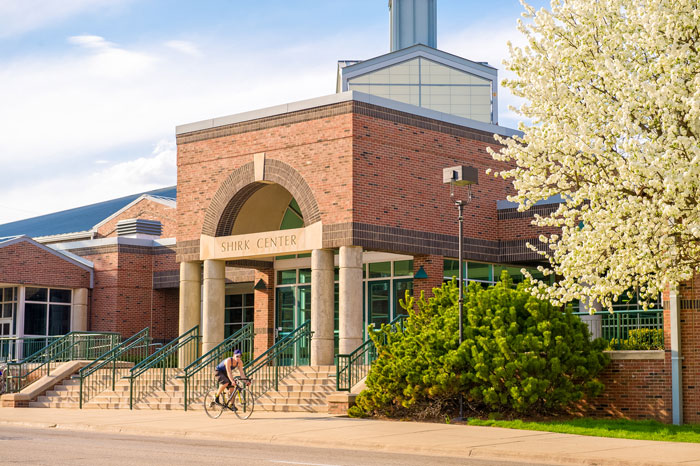
By Stew Salowitz '76
In 2024, the Shirk Athletic Center reached a new milestone with its 30th anniversary. The Center still serves as an essential community hub for campus and Bloomington- Normal.
· · ·
Jim Shirk was at a Jewel-Osco store in Bloomington, collecting Christmas entertaining groceries at the request of his wife, Linda.
It was a pretty simple task for Jim, the chairman of Bloomington-based Beer Nuts, the nationwide purveyor of snack products. Simple task, that is, right up to the time that his credit card chip was refused by the store’s machine.
Certain that there was no problem with the transaction, he handed the card over to the cashier. As she was inspecting it, she noticed the name, looked up and asked, “Shirk … Do you have anything to do with the Shirk Center?”
Modestly, Jim answered, “Well, sort of. In a way, yes.”
The cashier successfully processed his answer — along with his card — handed it back and said, “Well, my granddaughter was just there for a camp last week, and it is such a great building. Really, just a wonderful place to go.
Jim said quietly, “Yes … I know.”
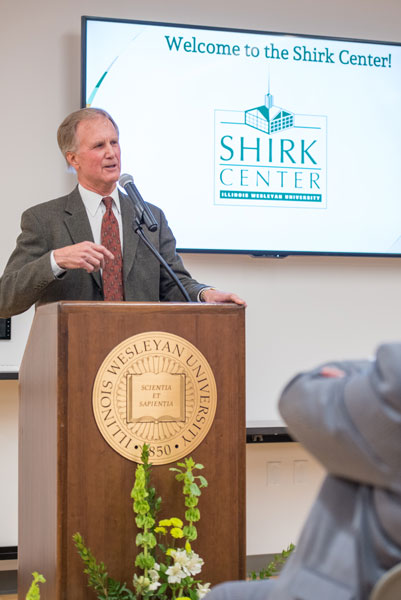
Jim admits that when he left the store and walked outside to his car, his perception was that the sun was a little bit brighter, the air smelled a little bit cleaner, and there was a little more pep in his step, all based on the unsolicited compliment given to the building that bears his last name, located on the Illinois Wesleyan campus but, for so many people, a community asset as well. Those similar proud feelings have been exuding from the Illinois Wesleyan family since 1994 as the school recognizes the Shirk Center’s 30th anniversary
After years in the planning and dreaming phase, the building became reality thanks in large part to an initial $5 million gift from the Russell and Betty Shirk Family Foundation. Russell Shirk ‘43 was a founder of the family-owned company that became Beer Nuts with its signature product being the sweet-and-salty glazed redskin peanuts.
“The Shirk Family Foundation had been planning to do something substantial for Illinois Wesleyan and for Jack Horenberger ‘36, my father’s close friend,” recalls Jim. “We had been setting money aside for an IWU-Horenberger project for almost 20 years but with no clear vision, while across town Dennie Bridges ‘61 and others at the school were trying to determine how to best upgrade their athletic facilities.”
In addition to being the baseball and basketball coach, Jack was IWU athletic director from 1942 until 1981, succeeded by Dennie , who held the position until 2015. “The opportunity to honor Jack would come later with the Shirk Foundation support and IWU’s 1997 commitment to Jack Horenberger Field,” said Jim.
“When ‘all the stars aligned’ and it was known that the project was going to happen, an aim in the planning stages was to make the final product large enough to have the performance arena in one part and the activity center or track in another. That was a clear break from facilities we had visited around the country,” said Dennie. “Throughout the process, all the constituencies united to agree on a building not just for the present but for future and not exclusively for University use. Very few compromises needed to be made – we never sacrificed any space for money. And the financial asks we made of Russ, Betty, Jim and the Shirk Foundation staked IWU to fulfill those plans.”
To that end, Dennie also cites the full support he received from then-IWU President Minor Myers jr.
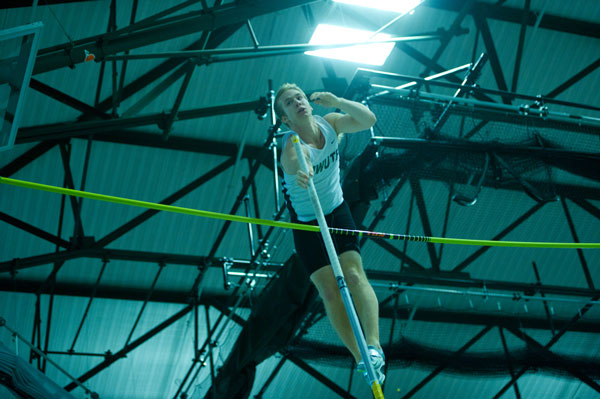
In 2016, another major gift from the Shirk Family Foundation was used for expansion to the building, adding fitness facilities and locker rooms and addressing classroom and storage needs.
Construction of the Shirk Center, connected to the already-built Fort Natatorium, set off a domino effect that profoundly impacted IWU athletics. It allowed for the razing of Fred Young Fieldhouse, which made way for new configurations of the outdoor track and football field, which also initiated development of the baseball, soccer and softball venues.
Appropriately, the performance arena court was named in 2015 for Dennie, whose men’s basketball teams won 93 of 98 games played at Shirk in his final seven seasons as head coach.
The investments and renovations have allowed Illinois Wesleyan to put the Shirk Center to outstanding use.In the 2024-25 school year, 630 student-athletes were competing in 27 varsity sports, nearly double the total of 322 student-athletes in 18 sports in 1994.
“The Shirk Center has not only elevated our overall numbers but has also impacted the level of talent we are able to recruit,” said Mike Wagner, who has been the Titans’ athletic director since 2015 and has worked at the school since 1992.
“When top high schoolers who may be looking at Division II or mid-major programs visit our campus, they definitely get a sense of what the Shirk Center can do for their development and experiences as a student-athlete at a D-III institution.
The facility hosts roughly 310 basketball games per year, including Titan games, the McLean County/Heart of Illinois Tournament, the 64-team State Farm Holiday Classic, and numerous youth clinics and tournaments including the Illinois Special Olympics state tourney. Additionally, about 16 college and high school track meets per year are centered around the 200-meter track.
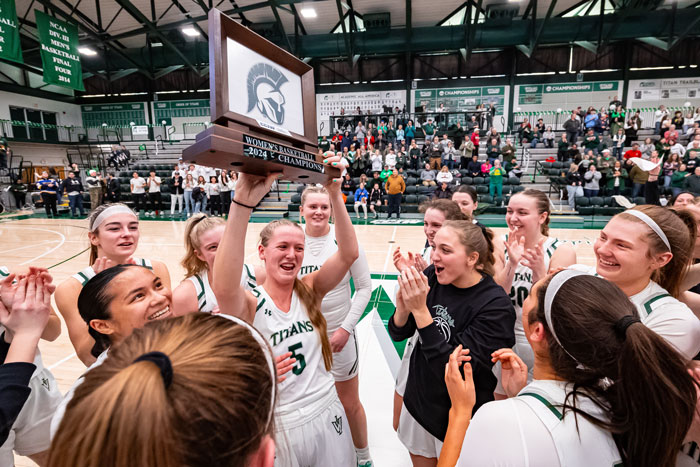
There have also been events that have shined national attention on IWU with Shirk hosting six NCAA Division III championships — women’s volleyball (2007, 2008), women’s basketball (2010, 2011) and indoor track and field (2000, 2005). Shirk will be the site of the Division III women’s volleyball national championships in December 2025.
Illinois Wesleyan President Sheahon Zenger was the athletic director at neighboring Illinois State University from 2005 to 2011 and vividly recalls the admiration he gained for the Shirk Center when he would attend events and bring his own children to camps.
“My first exposure to Illinois Wesleyan was through the Shirk Center,” said Zenger, “so I guess you could say that me being here is a direct result of the Shirk family vision for the center being used as a front porch to the community. The memories my family and I have from that time period, coupled with games and events I now attend as the president, make my heart swell with pride every time I walk through the Shirk Center doors.
A senior All-American on the women’s basketball team, Lauren Huber ‘25 senses a similar pride. “It’s where many of my favorite college memories have been made,” said Lauren, a four-year first team all-conference player. Huber sees “The Shirk” (or just “Shirk” in common parlance) as more than merely a building. “It’s really a resource that supports growth, learning, and connection for students, athletes, and the broader community.”
Titan student-athletes realize that not everything at Shirk is competition-based as it is also a place for classes and professional development.
“Through on-campus jobs, students get real-world experience and build their resumes,” said Lauren, a biology major who has worked in the training room, dealing with everything from football injuries to rehab sessions. “Those experiences have given me hands-on skills like taping techniques, which have strengthened my path toward physician assistant school after graduation.”
Currently the athletic director at Ripon College, Chris Schumacher was Illinois Wesleyan’s head track coach from 1997 to 2023.
“Coach Horenberger greeted me in the Shirk athletic suite on the morning of my first interview,” remembers Schumacher. “I had no idea how much the words he said to me, ‘Be at your best,’ would resonate over the next 25 years with the track and field programs and the countless shared memories behind the banners in the building.” Schumacher vividly recalls hosting IWU’s first indoor championship. “That 2000 class saw six seniors qualify for those NCAA championships with every one of them earning All-American honors. Then, when we hosted in 2005 we had two more All-Americans, propelling the women’s program to national prominence.”
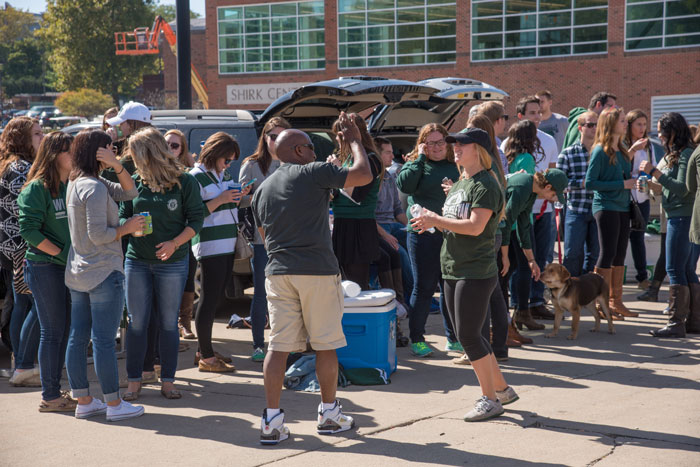
A tangible display of that national prominence are the 30 banners hanging at Shirk with 27 green ones representing top-four national finishes and three grey banners for teams ranked in the top-four before the COVID-19 pandemic ended their seasons prematurely.
While Shirk is bustling for so much of the year with competition and fans, women’s basketball coach Mia Smith finds a sort of Zen-like calmness in the building after the crowds are gone. “After games, I love walking through the arena. The lights are dimmed, sometimes the scoreboard is still on. The peace and tranquility of being in that space is very comforting to me.”
Wagner says the Shirk Center is shown respect by how it is cared for by students, faculty and staff. “At our fall student-athlete meeting, associate athletic director Tony Bankston reminds our students that, ‘This is our house’, and we need to treat it like home and encourage others to do the same.”
And just like the Jewel-Osco grocery cashier conveyed to Jim Shirk, Huber echoes how the Shirk Center’s positive impact extends beyond IWU. “Through the many youth meets, camps, and tournaments, it inspires the next generation of athletes and those moments spark a lifelong love of sports and community. It has been a cornerstone of our campus and the community for 30 years and it means so much to us.”